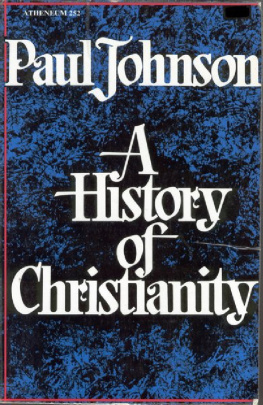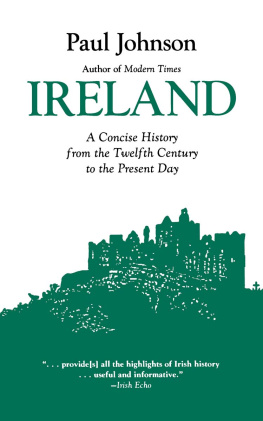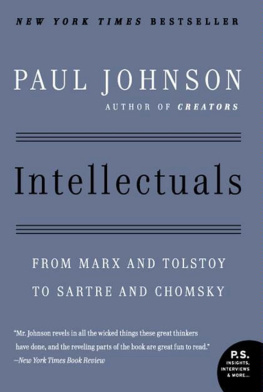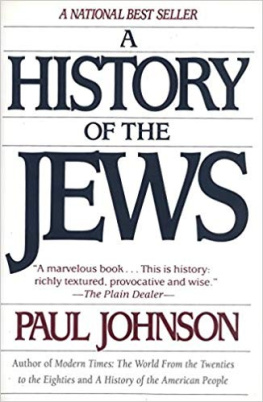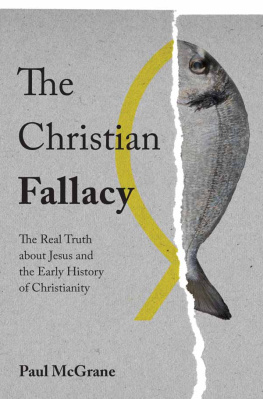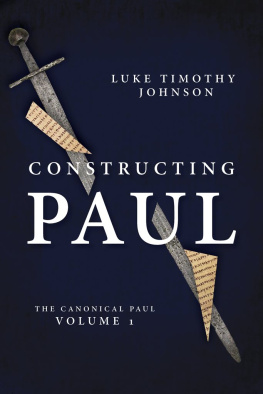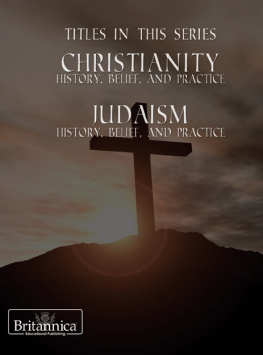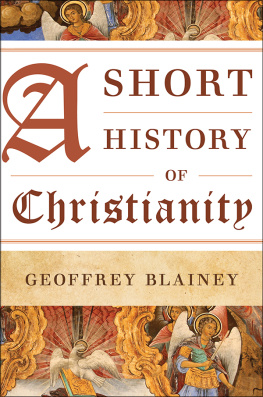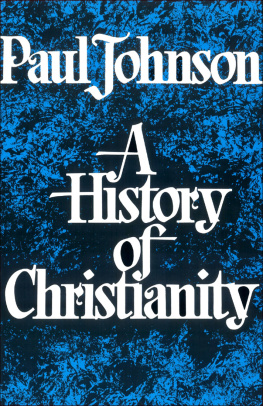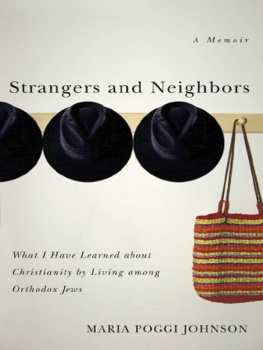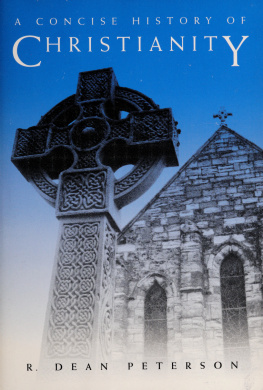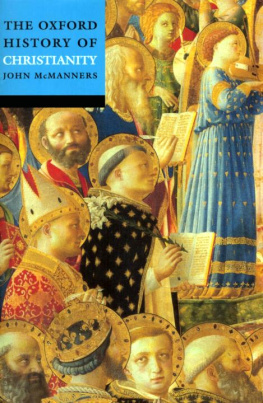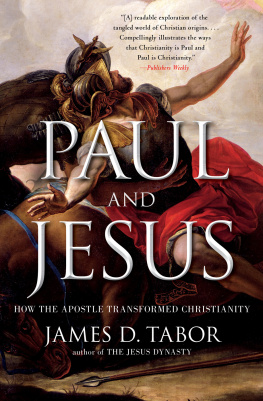A History Of Christianity
by
Paul JohnsonPrologue1. The Rise and Rescue of the Jesus Sect (50 BC-AD 250)2. From Martyrs to Inquisitors (AD 250-450)3. Mitred Lords and Crowned Ikons (450-1054)4. The Total Society and its Enemies (1054-1500)5. The Third Force (1500-1648)6. Faith, Reason and Unreason (1648-1870)7. Almost-Chosen Peoples (1500-1910)8. The Nadir of Triumphalism (1870-1975)Epilogue
* * *
Prologue
It is now almost 2000 years since the birth of Jesus Christ set in motion the chain of events which led to the creation of the Christian faith and its diffusion throughout the world. During these two millennia Christianity has, perhaps, proved more influential in shaping human destiny than any other institutional philosophy, but there are now signs that its period of predominance is drawing to a close, thereby inviting a retrospect and a balance sheet. In this book I have attempted to survey the whole history in one volume. This involves much compression and selection, but it has the advantage of providing new and illuminating perspectives, and of demonstrating how the varied themes of Christianity repeat and modulate themselves through the centuries. It draws on the published results of a vast amount of research which has been conducted during the past twenty years on a number of notable episodes in Christian history, and it aims to present the salient facts as modern scholars see and interpret them.It is, then, a work of history. You may ask: is it possible to write of Christianity with the requisite degree of historical detachment? In 1913 Ernst Troeltsch argued persuasively that sceptical and critical methods of historical research were incompatible with Christian belief; many historians and most religious sociologists would agree with him. There is, to be sure, an apparent conflict. Christianity is essentially a historical religion. It bases its claims on the historical facts it asserts. If these are demolished it is nothing. Can a Christian, then, examine the truth of these facts with the same objectivity he would display towards any other phenomenon? Can he be expected to dig the grave of his own faith if that is the way his investigations seem to point? In the past, very few Christian scholars have had the courage or the confidence to place the unhampered pursuit of truth before any other consideration. Almost all have drawn the line somewhere. Yet how futile their defensive efforts have proved! How ridiculous their sacrifice of integrity seems in retrospect! We laugh at John Henry Newman because, to protect his students, he kept his copy of The Age of Reason locked up in his safe. And we feel uncomfortable when Bishop Stubbs, once Regius Professor of Modern History at Oxford, triumphantly recordsas he did in a public lecturehis first meeting with the historian John Richard Green: 'I knew by description the sort of man I was to meet: I recognised him as he got into the Wells carriage, holding in his hand a volume of Renan. I said to myself, "If I can hinder, he shall not read that book." We sat opposite and fell immediately into conversation... He came to me at Navestock afterwards, and that volume of Renan found its way into my waste-paper basket.' Stubbs had condemned Renan's Vie de Jesus without reading it, and the whole point of his anecdote was that he had persuaded Green to do the same. So one historian corrupted another, and Christianity was shamed in both.For Christianity, by identifying truth with faith, must teachand, properly understood, does teachthat any interference with the truth is immoral. A Christian with faith has nothing to fear from the facts; a Christian historian who draws the line limiting the field of enquiry at any point whatsoever, is admitting the limits of his faith. And of course he is also destroying the nature of his religion, which is a progressive revelation of truth. So the Christian, according to my understanding, should not be inhibited in the smallest degree from following the line of truth; indeed, he is positively bound to follow it. He should be, in fact, freer than the non-Christian, who is precommitted by his own rejection. At all events, I have sought to present the facts of Christian history as truthfully and nakedly as I am able, and to leave the rest to the reader.
Iver, Buckinghamshire 19751. The Rise and Rescue of the Jesus Sect (50 BC-AD 250)
Some time about the middle of the first century AD, and very likely in the year 49, Paul of Tarsus travelled south from Antioch to Jerusalem and there met the surviving followers of Jesus of Nazareth, who had been crucified about sixteen years before. This Apostolic Conference, or Council of Jerusalem, is the first political act in the history of Christianity and the starting-point from which we can seek to reconstruct the nature of Jesus's teaching and the origins of the religion and church he brought into being.We have two near-contemporary accounts of this Council. One, dating from the next decade, was dictated by Paul himself in his letter to the Christian congregations of Galatia in Asia Minor. The second is later and comes from a number of sources or eye-witness accounts assembled in Luke's Acts of the Apostles. It is a bland, quasi-official report of a dispute in the Church and its satisfactory resolution. Let us take this second version first. It relates that 'fierce dissension and controversy' had arisen in Antioch because 'certain persons', from Jerusalem and Judea, in flat contradiction to the teaching of Paul, had been telling converts to Christianity that they could not be saved unless they underwent the Jewish ritual of circumcision. As a result, Paul, his colleague Barnabas, and others from the mission to the gentiles in Antioch, travelled to Jerusalem to consult with 'the apostles and elders'.There they had a mixed reception. They were welcomed by 'the church and the apostles and the elders'; but 'some of the Pharisaic party who had become believers' insisted that Paul was wrong and that all converts must not only be circumcized but taught to keep the Jewish law of Moses. There was 'a long debate', followed by speeches by Peter, who supported Paul, by Paul himself and Barnabas, and a summing up by James, the younger brother of Jesus. He put forward a compromise which was apparently adopted 'with the agreement of the whole Church'. Under this, Paul and his colleagues were to be sent back to Antioch accompanied by a Jerusalem delegation bearing a letter. The letter set out the terms of the compromise: converts need not submit to circumcision but they must observe certain precepts in the Jewish law in matters of diet and sexual conduct. Luke's record in Acts states that this half-way position was arrived at 'unanimously', and that when the decision was conveyed to the Antioch congregation, 'all rejoiced'. The Jerusalem delegates were thus able to return to Jerusalem, having solved the problem, and Paul carried on with his mission.This, then, is the account of the first council of the Church as presented by a consensus document, what one might call an eirenic and ecumenical version, designed to present the new religion as a mystical body with a co-ordinated and unified life of its own, moving to inevitable and predestined conclusions. Acts, indeed, says specifically that the ruling of the Council was 'the decision of the Holy Spirit'. No wonder it was accepted unanimously! No wonder that 'all' in Antioch 'rejoiced at the encouragement it brought'.Paul's version, however, presents quite a different picture. And his is not merely an eye-witness account, but an account by the chief and central participant, perhaps the only one who grasped the magnitude of the issues at stake. Paul is not interested in smoothing the ragged edges of controversy. He is presenting a case to men and women whose spiritual lives are dominated by the issues confronting the elders in that room in Jerusalem. His purpose is not eirenic or ecumenical, still less diplomatic. He is a man burning to tell the truth and to imprint it like fire in the minds of his readers. In the apocryphal Acts of Paul, written perhaps a hundred years after his death, the tradition of his physical appearance is vividly preserved: '... a little man with a big, bold head. His legs were crooked, but his bearing was noble. His eyebrows grew close together and he had a big nose. A man who breathed friendliness.' He himself says that his appearance was unimpressive. He was, he admits, no orator; not, in externals, a charismatic leader. But the authentic letters which survive him radiate the inner charisma: they have the ineffaceable imprint of a massive personality, eager, adventurous, tireless, voluble, a man who struggles heroically for the truth and then delivers it in uncontrollable excitement, hurrying ahead of his powers of articulation. Not a man easy to work with, or confute in argument, or rebuke into silence, or to advance a compromise: a dangerous, angular, unforgettable man, breathing friendliness, indeed, but creating monstrous difficulties and declining to resolve them by any sacrifice of the truth.Moreover, Paul was quite sure he had got the truth. He has no reference to the Holy Spirit endorsing, or even advancing, the compromise solution as presented by Luke. In his Galatians letter, a few sentences before his version of the Jerusalem Council, he dismisses, as it were, any idea of a conciliar system directing the affairs of the Church, any appeal to the judgment of mortal men sitting in council. 'I must make it clear to you, my friends,' he writes, 'that the gospel you heard me preach is no human invention. I did not take it over from any man; no man taught it me; I received it through a revelation of Jesus Christ.' Hence, when he comes to describe the council and its consequences he writes exactly as he feels, in harsh, concrete and unambiguous terms. His Council is not a gathering of inspired pneumatics, operating in accordance with infallible guidance from the spirit, but a human conference of weak and vulnerable men, of whom he alone had a divine mandate. How, as Paul saw it, could it be otherwise? Jewish elements were wrecking his mission in Antioch, which he was conducting on the express instructions of God, 'who had set me apart from birth and called me through his grace, chose to reveal his Son to me and through me, in order that I might proclaim him among the gentiles'. To defeat them, therefore, he went to Jerusalem 'because it had been revealed by God that I should do so'. He saw the leaders of the Jerusalem Christians, 'the men of repute', as he terms them, 'at a private interview'. These men, James, Christ's brother, the Apostles Peter and John, 'those reputed pillars of our society', were inclined to accept the gospel as Paul taught it and to acknowledge his credentials as an apostle and teacher of Christ's doctrine. They divided up the missionary territory, 'agreeing that we should go to the gentiles while they went to the Jews'. All they asked was that Paul should ensure that his gentile congregations should provide financial support for the Jerusalem Church, 'which was the very thing I made it my business to do.' Having reached this bargain, Paul and the pillars 'shook hands on it'. There is no mention that Paul made concessions on doctrine. On the contrary, he complains that enforcing circumcision on converts had hitherto been 'urged' as a sop to 'certain sham-Christians, interlopers who had stolen in to spy upon the liberty we enjoy in the fellowship of Jesus Christ'. But 'not for a moment did I yield to their dictation.' He was 'determined on the full truth of the gospel'. Unfortunately, continues Paul, his apparent victory at Jerusalem did not end the matter. The 'pillars', who had contracted to stand firm against the Jewish 'sham-Christians', in return for financial support, did not do so. When Peter later came to Antioch, he was prepared at first to treat gentile Christians as religious and racial equals and eat his meals with them; but then, when emissaries from James arrived in the city, he 'drew back and began to hold aloof, because he was afraid of the advocates of circumcision'. Peter was 'clearly in the wrong'. Paul told him so 'to his face'. Alas, others showed the 'same lack of principle', even Barnabas, who 'played false like the rest'. Paul writes in a context in which the battle, far from being won, is continuing and becoming more intense; and he gives the distinct impression that he fears it could be lost.Paul writes with passion, urgency and fear. He disagrees with the account in Acts not merely because he sees the facts differently but because he has an altogether more radical idea of their importance. For Luke, the Jerusalem Council is an ecclesiastical incident. For Paul, it is part of the greatest struggle ever waged. What lies behind it are two unresolved questions. Had Jesus Christ founded a new religion, the true one at last? Or, to put it another way, was he God or man? If Paul is vindicated, Christianity is born. If he is overruled, the teachings of Jesus become nothing more than the hallmarks of a Jewish sect, doomed to be submerged in the mainstream of an ancient creed.To demonstrate why Paul's analysis was substantially correct, and the dispute the first great turning point in the history of Christianity, we must first examine the relationship between Judaism and the world of the first century AD. By the time of Christ, the Roman republic, which had been doubling in size with every generation, had expanded to encompass the whole of the Mediterranean theatre. It was in some respects a liberal empire, bearing the marks of its origins. This was a new, indeed unique, conjunction in world history: an empire which imposed stability and so made possible freedom of trade and communications throughout a vast area, yet did not seek to regiment ideas or inhibit their exchange and propagation. The Roman law could be brutal and was always relentless, but it still operated over a comparatively limited area of human conduct. Many fields of economic and cultural activity lay outside its scope. Moreover, even where the law prescribed, it was not always assiduous. Roman law tended to sleep unless infractions were brought to its attention by the external signs of disorder: vociferous complaints, breaches of the peace, riots. Then it warned, and if its warnings went unheeded, acted with ferocity until silence was reimposed; afterwards, it would sleep again. Within Roman rule, a sensible and circumspect man, however antinomian his views, could survive and flourish, and even propagate them; it was one very important reason why Rome was able to extend and perpetuate itself.In particular, Rome was tolerant towards the two great philosophical and religious cultures which confronted it in the central and eastern Mediterranean: Hellenism and Judaism. Rome's own republican religion was ancient but primitive and jejune. It was a religion of State, concerned with civil virtues and outward observance. It was administered by paid government functionaries and its purposes and style were indistinguishable from those of the State. It did not touch the heart or impose burdens on a man's credulity. Cicero and other intellectuals defended it on no higher grounds than that it was an aid to public decorum. Of course, being a state religion, it modified itself as the forms of government changed. When the republic failed, the new emperor became, ex officio, the Pontifex Maximus. Imperialism was an eastern idea; and it carried with it the notion of quasi-divine powers invested in the ruler. Accordingly, after the death of Caesar, the Roman senate usually voted the deification of an emperor, provided he had been successful and admired; a witness would swear he had seen the dead man's soul wing to heaven from the funeral pyre. But the system which linked divinity to government was observed more in the letter than the spirit; sometimes not even in the letter. Emperors who claimed divinity in their lifetimesCaligula, Nero, Domitianwere not so honoured once they were safely dead; and the compulsory veneration of a living emperor was more likely to be enforced in the provinces than in Rome. Even in the provinces the public sacrifices were simply a routine genuflection to government; on the vast majority of Rome's citizens and subjects they imposed no burden of conscience.The State's compulsory but marginal civic creed thus left ample freedom for the psyche within the empire. Every man could have and practise a second religion if he chose. Or, to put it another way, the mandatory civic cult made possible freedom of worship. The choice was enormous. There were some cults of specific Roman origin and taste. Then, all the subject peoples who had been absorbed into the empire had their own gods and goddesses; they often won adherents because they were not identified with the State and their native ceremonies and priests had exotic glamour. The religious scene was constantly shifting. All, and especially the well-to-do, were encouraged to participate in it by the very nature of the educational system, which was identified with no cult but was in a sense the domicile of all. The empirical quest for religious truth was inseparable from any other form of knowledge. Theology was part of philosophy, or vice versa', and rhetoric, the art of proof and disproof, was the handmaiden of both. The common language of the empire was Greek and it was especially the tongue of business, education, and truth-seeking. And Greek, as a language and as a culture, was transforming the Roman world-view of religious experience. Greek religion, like Roman, had been in origin a series of city-cults, public demonstrations of fear, respect and gratitude towards the home-gods of the city-state. Alexander's creation of a Hellenic empire had transformed the city-states into a vast territorial unit, in which the free citizen was no longer, as a rule, directly involved in government. He thus had time, opportunity, and above all motive to develop his private sphere and explore his own individual and personal responsibilities. Philosophy began to direct itself increasingly to intimate conduct. Thus, under the impulse of the Greek genius, an age of personal religion opened. What had hitherto been purely a matter of tribal, racial, city, state orin the loosest sensesocial conformity now became a matter of individual concern. Who am I? Where am I going? What do I believe? What, then, must I do? These questions were being asked increasingly, and not only by Greeks. The Romans were undergoing a similar process of emancipation from all-demanding civic duty. Indeed, one could say that the world-empire itself freed multitudes from the burdens of public concern and gave them leisure to study their navels. In the schools, the stress was increasingly on moral teaching, chiefly Stoic in origin. Lists of vices and virtues, and the duties of fathers to children, husbands to wives, masters to slavesand vice versawere compiled.But this, of course, was mere ethics, not essentially different from municipal codes of behaviour. The schools did not, or could not, answer many questions now regarded as fundamental and urgent, questions which revolved around the nature of the soul and its future, and its relationship to the universe and eternity. And once such questions were asked, and recorded as having been asked, they would not go away: civilization was maturing. In the Middle Ages, Christian metaphysicians were to portray the Greeks in the decades before Christ as struggling manfully but blindly towards a knowledge of God, trying, as it were, to conjure up Jesus out of the thin Athenian air, to invent Christianity out of their poor pagan heads. In a sense, this supposition is right: the world was intellectually ready for Christianity. It was waiting for God. But it is unlikely the Hellenic world could have produced such a system from its own resources. Its intellectual weapons were various and powerful. It had a theory of nature and a cosmology of sorts. It had logic and mathematics, the rudiments of an empirical science. It could develop methodologies. But it lacked the imagination to relate history to speculation, to produce that startling blend of the real and the ideal which is the religious dynamic. The Greek culture was an intellectual machine for the elucidation and transformation of religious ideas. You put in a theological concept and it emerged in a highly sophisticated form, communicable to the entire civilized world. But Greece could not, or at any rate did not, produce the ideas themselves. These came from the east, from Babylon, Persia, Egypt, mostly tribal or national cults in origin, later liberated from time and place by transformation into cults attached to individual deities. These gods and goddesses lost their localities, changed their names, amalgamated themselves with other, once-national or tribal gods, and then, in turn, moved westwards and were syncretized with the gods of Greece and Rome: thus the Baal of Dolichenus was identified with Zeus and Jupiter, Isis with Ishtar and Aphrodite. By the time of Christ there were hundreds of such cults, perhaps thousands of sub-cults. There were cults for all races, classes and tastes, cults for every trade and situation in life. A new form of religious community appeared for the first time in history: not a nation celebrating its patriotic cult, but a voluntary group, in which social, racial and national distinctions were transcended: men and women coming together just as individuals, before their god.Thus the religious climate, though infinitely various, was no longer wholly bewildering: it was beginning to clear. Indeed, these new forms of voluntary religious association had a tendency to develop in certain particular and significant directions. The new gods were increasingly seen as 'Lords' and their worshippers as servants; there was a growth of the ruler-cult, with the king-god as saviour and his enthronement as the dawn of civilization. Above all, there was a marked tendency towards monotheism. More and more men were looking not just for a god, but God, the God. In the strongly syncretist Hellenic world, where the effort to reconcile religions was most persistent and successful, the gnostic cults which were now emerging, and which offered new keys to the universe, were based on the necessity of monotheism, even though they assumed a dualistic universe operated by rival forces of good and evil. So the religious scene was moving, progressing all the time. What it lacked was any kind of stability. It became increasingly less likely that an educated man would support the cult of his parents, let alone his grandparents; or even that he would fail to change his cult once, perhaps twice, in his life. And, perhaps less noticeably, the cults themselves were in constant osmosis. We do not know enough about the time to provide complete explanations for this constant and ubiquitous religious flux. But it is obvious enough that the old city and national creeds were now hopelessly obsolete except as aids to public decorum, and the oriental mystery cults, though syncretized and rendered sophisticated by the Hellenic philosophical machine, still could not provide a satisfactory account of man and his future. There were huge gaps and anomalies in all the systems. And the frantic efforts to plug them produced disintegration, and so yet more change.It is at this point in the argument that we see the crucial relevance of the Jewish impingement on the Roman world. For the Jews not merely had a god; they had God. They had been monotheists for at least two millennia. They had resisted with infinite fortitude and sometimes with grievous suffering, the temptations and ravages of eastern polytheistic systems. It is true that their god was originally tribal, and more recently national; in fact he was still national, and since he was closely and intimately associated with the Temple in Jerusalem, he was in some way municipal too. But Judaism was also, and very much so, an interior religion, pressing closely and heavily on the individual, who was burdened with a multitude of injunctions and prohibitions which posed acute problems of interpretation and scruple. The practising Jew was essentially homo religiosus as well as a functionary of a patriotic cult. The two aspects might even conflict, for Pompey was able to breach the walls of Jerusalem in 65 BC primarily because the stricter elements among the Jewish defenders refused to bear arms on the sabbath.It could be said, in fact, that the power and dynamism of the Jewish faith transcended the military capacity of the Jewish people. The Jewish state might, and did, succumb to empires, but its religious expression survived, nourished and violently resisted cultural assimilation or change. Judaism was greater than the sum of its parts. Its angular will to survive was the key to recent Jewish history. Like other Middle-eastern states, Jewish Palestine had fallen to Alexander of Macedon and then had become a prize in the dynastic struggles which followed his death in 323 BC. It had eventually fallen to the Graeco-oriental monarchy of the Seleucids, but had successfully resisted Hellenization. The attempt by the Seleucid king, Antiochus Epiphanes, in 168 BC, to impose Hellenic norms on Jerusalem, and especially on the Temple, had provoked armed revolt. There was then, and there remained throughout this period, a Hellenizing party among the Jews, anxious to submit to the cultural processing-machine. But it never formed the majority, and it was to the majority that the Maccabean brothers appealed against the Seleucids, seizing Jerusalem, and cleansing the Temple of Greek impurities in 165 BC. This bitter religious war inevitably strengthened the connection in the Jewish mind between history, religion, and the future aspirations of the people and the individual, no real distinction being drawn between national destiny and a personal eternity of happiness. But the connection was variously interpreted and rival predictions and theories jostled each other in the sacred books. The oldest of the Maccabean writings in the Old Testament, opposing the revolt led by the brothers, is the Book of Daniel, which foretells the fall of empires through the agency of God, not man: 'one like a son of man' will come on the clouds of heaven, embodying the apocalyptic hope of the Jews, and accompanied by a general resurrection of the dead. By contrast, the first book of Maccabees insists that God helps those who help themselves. Its successor, by Jason of Cyrene, emphasizes the transcendent power of God and reverts to the idea of a bodily resurrection and the potency of miracles.The Jews, then, were unanimous in seeing history as a reflection of God's activity. The past was not a series of haphazard events but unrolled remorselessly according to a divine plan which was also a blueprint and code of instructions for the future. But the blueprint was cloudy; the code uncracked; or, rather, there were rival and constantly changing systems for cracking it. And, since the Jews could not agree on how to interpret their past or how to prepare for the future, they tended to be equally divided on what they should do at present. Jewish opinion was a powerful force, but an exceptionally volatile and fragmented one. Jewish politics were the politics of division and faction. After the Maccabean revolt, the Jews had kings who were also high priests, accorded recognition by an expanding Roman empire, but rivalries of scriptural interpretation led to irreconcilable disputes over policies, successions, claims, descents. There was a strong element in the Jewish priesthood and society which regarded Rome as the least of various evils, and it was this faction which invited Pompey's intervention in 65 BC.Granted a stable political framework, the Jewish potential was enormous. The Jews could not provide stability for themselves and the Romans did not find it easy either, chiefly because they could not decide on the constitutional status of their acquisition, a recurrent problem in their empire. Confronted with a stiff-necked subordinate people, with a strong cultural tradition of its own, they always hesitated to impose direct rule, except in extremis, preferring, instead, to work with a local 'strong man', personally attached to Rome, who could deal with his subjects in their own vernacular of law and custom; such a man could be rewarded (and contained) if successful, dropped and replaced if he failed. Thus Judea was placed under the new province of Syria, ruled by a governor in Antioch and local authority was entrusted to ethnarchs, recognized as 'kings' if they proved themselves sufficiently durable and ruthless. Under the Syrian province, Herod, who seized the Judean throne in 43 BC, was confirmed as 'King of the Jews' four years later, and granted Roman approval and protection. Herod was the type of man with whom Rome preferred to deal, to the point where they accepted and endorsed his arrangement for dividing his kingdom after his death among three sons, Archelaus, who got Judea, Herod Philip, and Herod Antipas. The division was not entirely successful, for in AD 6 Judea had to be placed in direct Roman custody under a succession of procurators; and in the 60s, the system as a whole blew up, in a disastrous revolt and bloody reprisal, the cycle repeating itself in the next century, until Rome, in exasperation, razed Jerusalem to the ground and rebuilt it as a pagan city. The Romans never solved the Palestine problem.Nevertheless, especially in its early decades under Herod the Great, Rome's relationship with the Jews was fruitful. There was already a huge Jewish diaspora, especially in the great cities of the eastern MediterraneanAlexandria, Antioch, Tarsus, Ephesus, and so forth. Rome itself had a large and rich Jewish colony. During the Herodian years, the diaspora expanded and flourished. The empire gave the Jews equality of economic opportunity and freedom of movement for goods and persons. They formed wealthy communities wherever the Romans had imposed stability. And in Herod they had a munificent and powerful patron. To many Jews he was suspect and some refused to recognize him as a Jew at allnot on account of his voluptuous and exceptionally violent private life, but because of his Hellenic attachments. But Herod was unquestionably generous to the Jews. In Jerusalem, he rebuilt the Temple on twice the scale of Solomon. This huge and magnificent enterprise was still uncompleted at Herod's death in 4 BC, and was finished in Jesus's lifetime. It was large and expensive even by the standards of Graeco-Roman architecture, and one of the great tourist sights of the empire: an impressive symbol of a fierce, living, expanding religion. Herod was equally generous to the diaspora Jews. In all the big cities he provided them with community centres and he endowed and built scores of synagogues, the new type of ecclesiastical institution, prototype of the Christian basilica, where services were held for the dispersed. In the great Roman cities, the Jewish communities gave an impression of wealth, increasing power, self-confidence and success. Within the Roman system, they were exceptionally privileged. Many of the diaspora Jews were already Roman citizens, and all Jews, since the days of Julius Caesar, who greatly admired them, enjoyed rights of association. This meant they could meet to hold religious services, community dinners and feasts, and for every kind of social and charitable purpose. The Romans recognized the strength of Jewish religious feelings by, in effect, exempting them from observance of the state religion. In place of emperor-worship, the Jews were allowed to show their respect for the state by offering sacrifices on the emperor's behalf. This was a unique concession. The wonder is that it was not more resented. But the diaspora Jews were, on the whole, admired and imitated, rather than envied. They were not in the least self-effacing. They could, when they chose, play a leading role in municipal politics, especially in Egypt, where they were perhaps over a million strong. Some had notable careers in the imperial service. Among these there were passionate admirers of the Roman system, like the historian Josephus, or the philosopher Philo. While the Jews of Judea, and still more so of semi-Jewish areas like Galilee, tended to be poor, backward, obscurantist, narrow-minded, fundamentalist, uncultured and xenophobic, the diaspora Jews were expansive, rich, cosmopolitan, well-adjusted to Roman norms and to Hellenic culture, Greek-speaking, literate and open to ideas.They were also, in notable contrast to the Palestine Jews, anxious to spread their religion. In general, diaspora Jews were proselytizers, often passionately so. Throughout this period some Jews at least had Universalist aims, and hoped that Israel would be 'the light of the gentiles'. The Greek adaptation of the Old Testament, or Septuagint, which was composed in Alexandria and was widely used in diaspora communities, has an expansionist and missionary flavour quite alien to the original. And there were in all probability catechisms and manuals for aspiring converts, reflecting the liberal-mindedness and large-heartedness of the diaspora Jew to the gentile. Philo, too, projected in his philosophy the concept of a gentile mission and wrote joyfully: There is not a single Greek or barbarian city, not a single people, to which the custom of Sabbath observance has not spread, or in which the feast days, the kindling of the lights, and many of our prohibitions about food are not heeded.' This claim was generally true. Though it is impossible to present accurate figures, it is clear that by the time of Christ the diaspora Jews greatly outnumbered the settled Jews of Palestine: perhaps by as many as 4.5 million to 1 million. Those attached in some way to the Jewish faith formed a significant proportion of the total population of the empire and in Egypt, where they were most strongly entrenched, one in every seven or eight inhabitants was a Jew. A large proportion of these people were not Jewish by race. Nor were they full Jews in the religious sense: that is, few of them were circumcized or expected to obey the law in all its rigour. Most of them were noachides, or God-fearers. They recognized and worshipped the Jewish God and they were permitted to mingle with synagogue worshippers to learn Jewish law and customsexactly like the future Christian catechumens. But, unlike the catechumens, they were not generally expected to become full Jews; they had intermediate status of various kinds. On the other hand, they seemed to have played a full role in Jewish social arrangements. Indeed, this was a great part of the appeal of diaspora Judaism. The Jews, with their long and assured tradition of monotheism, had much to offer to a world looking for a sure, single god, but their ethics were in some ways even more attractive than their theology. The Jews were admired for their stable family life, for their attachment to chastity while avoiding the excesses of celibacy, for the impressive relationships they sustained between children and parents, for the peculiar value they attached to human life, for their abhorrence of theft and their scrupulosity in business. But even more striking was their system of communal charity. They had always been accustomed to remit funds to Jerusalem for the upkeep of the Temple and the relief of the poor. During the Herodian period they also developed, in the big diaspora cities, elaborate welfare services for the indigent, the poor, the sick, widows and orphans, prisoners and incurables. These arrangements were much talked about and even imitated; and, of course, they became a leading feature of the earliest Christian communities and a principal reason for the spread of Christianity in the cities. On the eve of the Christian mission they produced converts to Judaism from all classes, including the highest: Nero's empress, Poppaea, and her court circle, were almost certainly God-fearers, and King Izates II of Adiabene on the Upper Tigris embraced a form of Judaism with all his house. There were probably other exalted converts. Certainly many authors, including Seneca, Tacitus, Suetonius, Horace and Juvenal, testify to successful Jewish missionary activity in the period before the fall of Jerusalem.Was there a real possibility that Judaism might become the world religion in an age which longed for one? Or, to put it another way, if Christianity had not intervened, capitalized on many of the advantages of Judaism, and taken over its proselytizing role, might Judaism have continued to spread until it captured the empire? That was the way some Jews in the diaspora certainly wished to go; the same Jews, of course, who embraced Christianity when the opportunity arose. But plainly Judaism could not become a world religion without agonizing changes in its teaching and organization. It bore the marks of its tribal origins in more than a notional sense. The priests were supposed to be descendants of the tribe of Aaron, temple-attendants of Levi, kings and rulers of David, and so forth. These rules were not always observed and exact heredity was a matter of guesswork, imagination or downright fraud, but manifest breaches were always resented and frequently led to violence and schism over generations. Then, too, there was the obstacle of circumcision, on which no compromise seemed possible within the Judaic framework; and the monstrous ramifications of a legal system which had elaborated itself over many generations. The Jewish scriptures, formidable in bulk and often of impenetrable obscurity, gave employment in Palestine to a vast cottage industry of scribes and lawyers, both amateur and professional, filling whole libraries with their commentaries, enmeshing the Jewish world in a web of canon law, luxuriant with its internal conflicts and its mutual exclusions, too complex for any one mind to comprehend, bread and butter for a proliferating clergy and an infinite series of traps for the righteous. The ultimate success of a Gentile mission would depend on the scale and hardihood of the demolition work carried out on this labyrinth of Mosaic jurisprudence.And where would the demolition stop? Must it not be extended to the Temple itself, whose very existence as the geographical pivot of the faith anchored it firmly in place and history, and thus denied its universality? The Temple, now, in Herod's version, rising triumphantly over Jerusalem, was an ocular reminder that Judaism was about Jews and their historynot about anyone else. Other gods flew in across the deserts from the East without much difficulty, jettisoning the inconvenient and embarrassing accretions from their past, changing, as it were, their accents and manners as well as their names. But the God of the Jews was still alive and roaring in his Temple, demanding blood, making no attempt to conceal his racial and primitive origins. Herod's fabric was elegant, modern, sophisticatedhe had, indeed, added some Hellenic decorative effects much resented by fundamentalist Jews who constantly sought to destroy thembut nothing could hide the essential business of the Temple, which was the ritual slaughter, consumption and combustion of sacrificial cattle on a gigantic scale. The place was as vast as a small city. There were literally thousands of priests, attendants, temple-soldiers and minions. To the unprepared visitor, the dignity and charity of Jewish diaspora life, the thoughtful comments and homilies of the Alexandrian synagogue, was quite lost amid the smoke of the pyres, the bellows of terrified beasts, the sluices of blood, the abattoir stench, the unconcealed and unconcealable machinery of tribal religion inflated by modern wealth to an industrial scale. Sophisticated Romans who knew the Judaism of the diaspora found it hard to understand the hostility towards the Jews shown by colonial officials who, behind a heavily-armed escort, had witnessed Jerusalem at festival time. Diaspora Judaism, liberal and outward-minded, contained the matrix of a universal religion, but only if it could be cut off from its barbarous origins; and how could so thick and sinewy an umbilical cord be severed?In a sense, the same problem and tension could be felt within Palestine Judaism. Jews were aware of the huge dynamic within their faith and of the almost intolerable restraints from the past which bound and emasculated it. Able, industrious, God-fearing, they felt bitter and frustrated by their manifest inability to solve their political problems. There was a yawning gap between their religious pretensions, their historical claims, their elect status, on the one hand, and the ugly reality of poverty and subservience to the kittim. Was there not something monstrously wrong with a nation which complained bitterly of Roman taxation and misrule, yet insisted that the empire was at least preferable to the mess the Jews would make of it themselves? To what extent was the disjunction between Jewish aspiration and performance the responsibility of a fallacious religious analysis and prognosis? These questions and others, constantly asked, never satisfactorily answered, kept the Jewish world on the brink of a perpetual reformation. In some ways Judaism was highly unstable, and it was certainly fissiparous. It had gaps. The Jews took their theory of nature from the Greeks. There is no proper cosmology in the Old Testament; it was not entirely clear to the Jews where exactly God was in relation to man, in either space or time. Satan rarely made his appearance so could not be regarded as the causal agent of sin, and only a few Jews accepted the oriental explanation of twin worlds of good and evil, forever battling. All Jews acknowledged angels, intermediate beings in strict hierarchical order. But they did not really have a theory of God. God did things: created the world, guided it, chose Israel, laid down the law; but it was not clear why he existed or what his ultimate purpose and ambition was. He appeared eccentric, sometimes motiveless. Nor was he all-powerful since, as judge, he was bound by his own law. In a sense, then, the law was God; there was thus no room for grace and a man could save himself only by his good works. His relationship with God, therefore, was a purely legalistic one. This might have been tolerable had the law been clear. But most of it was not statute but case-law. It did not lay down instructions for daily life but was a comprehensive collection of possible instances, with extensive discussion. A great deal of it was concerned with the Temple itself. Some of it was archaic, irrelevant; much of the rest was open to violent disagreement.Quarrels over varied approaches to the law were compounded by rival interpretations of the post-Maccabean situation. Palestine Judaism was not a unitary religion but a collection of sects: it is possible,*) even from the fragmentary sources, to enumerate as many as twenty-four. All the sects were monotheistic, of course, and all accepted the law in some form. But agreement went no further. The Samaritans had broken the connection with the Temple and had their own sanctuary on Mount Gerizim; many would not allow them to be Jews at all. On the other hand, the Essenes did not recognize the Temple either and they were agreed to be one of the purest and strictest sects. There was no ruling orthodoxy: that is, hieratic power was not identified with the prevailing tendency. The high priesthood, under the procuratorship, was in the hands of Sadducee aristocrats, who supported and upheld the Roman occupation. They were rich, conservative, linked among themselves by complex family alliances, had large estates and saw Roman rule underpinning all these things more securely than a national kingship. We do not know much about their teaching, since Judaism achieved a high degree of Pharisaic unity after the destruction of the Temple in 70 AD, and Sadducee traditions were not preserved. But they do not seem to have believed in life after death or the intervention of providence. Their religion was defective and in some respects quite impracticable, since they interpreted the law literally without any allowance for historical change, so they could have no popular following. They were, in fact, a class of collaborators, ruling the colony through the High Council of Jerusalem, which sat on the Temple Mount, and was referred to as the Sanhedrin. The Romans upheld the powers of the Council and when necessary enforced Jewish cult rules, such as the exclusion of Gentiles from the Temple. They addressed their official letters to the 'rulers, senate and people of the Jerusalemites', thus giving the Sanhedrin the status of an elective municipality in a major city. In fact, throughout this period it was little more than the family circle of Annas, the high priest, who was appointed by the procurator and removable at will.

